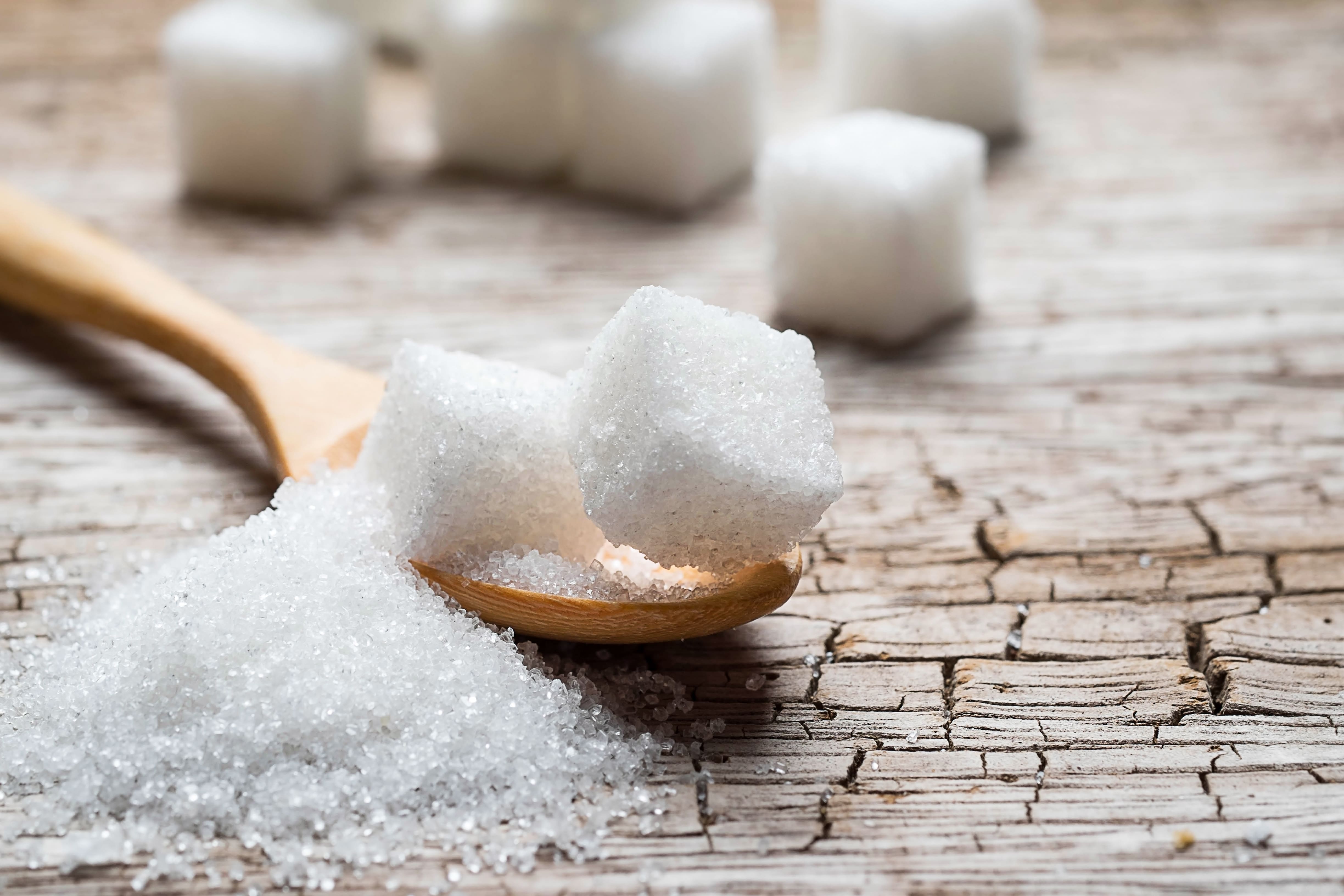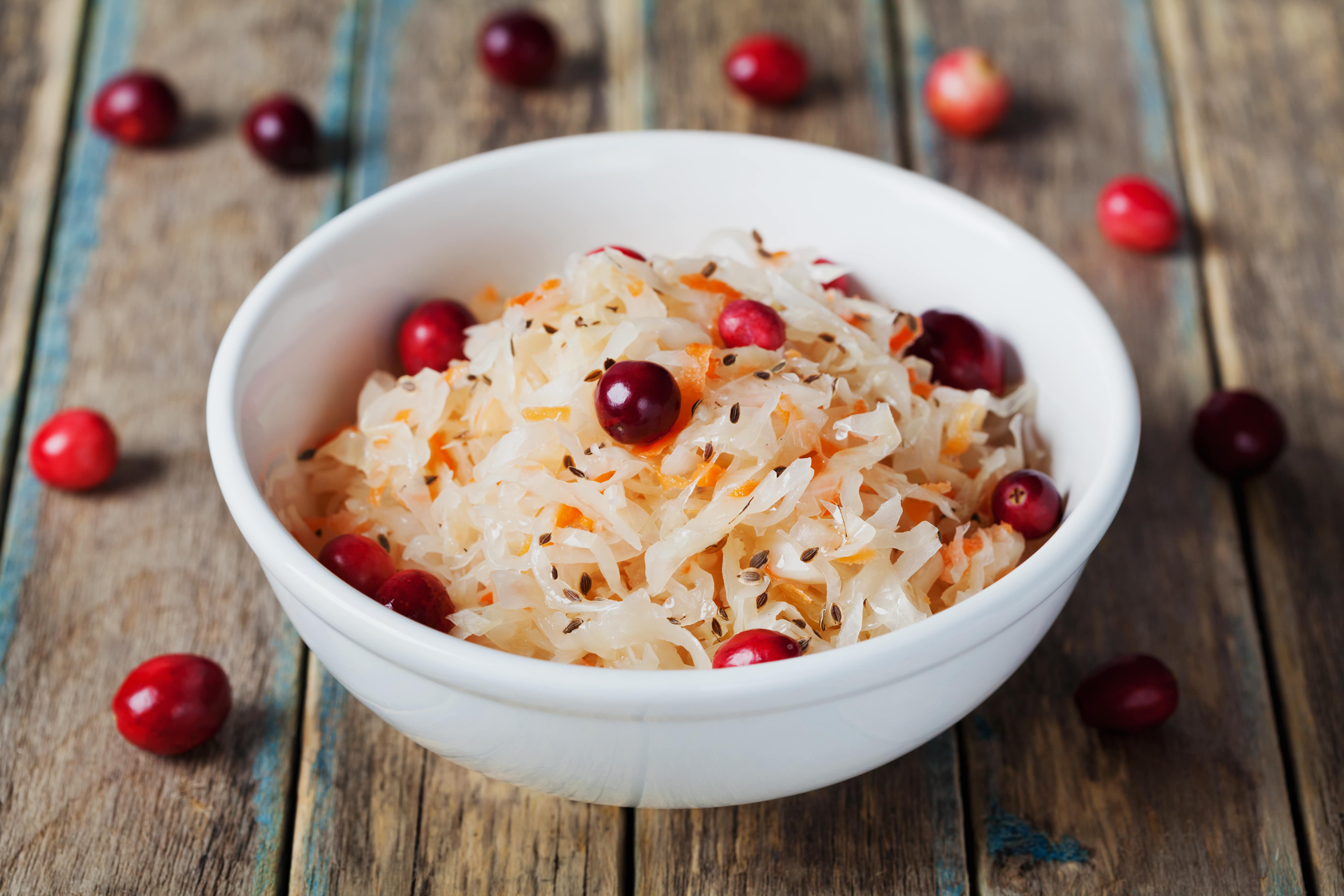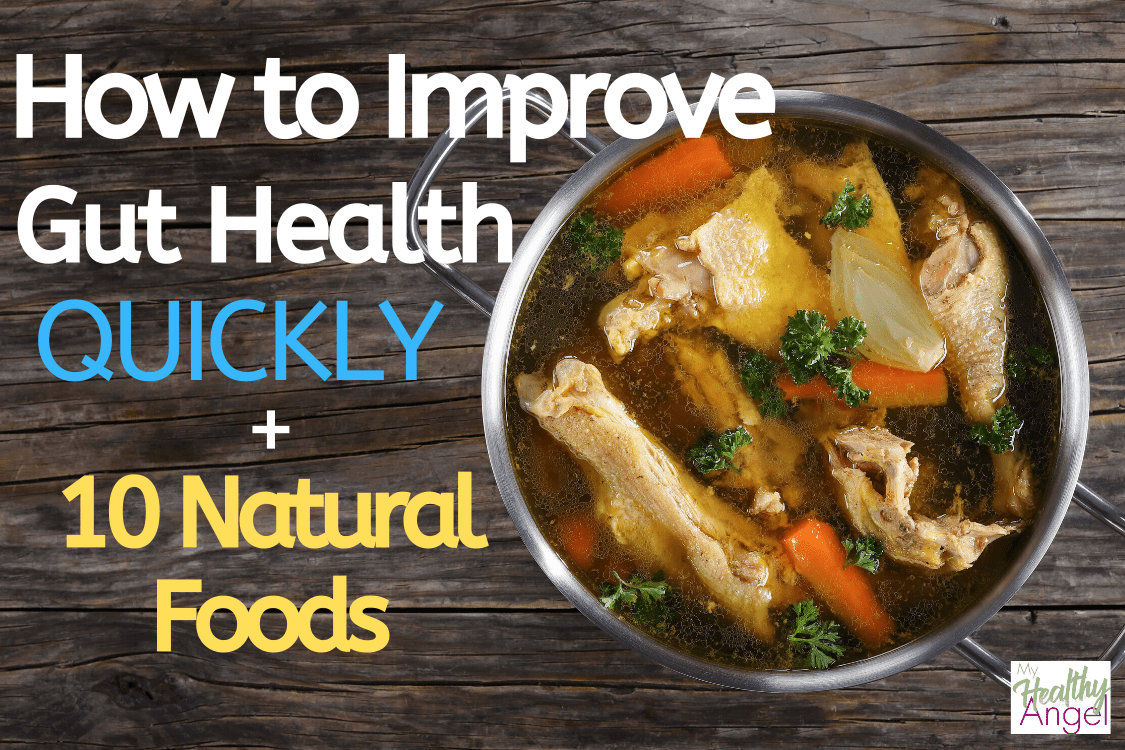Have you heard about leaky gut or gut health? I’m sure you have – gut health has been all the rage -we can’t get enough about our digestive tract. You wonder if it’s another money-making health trend or if the information out there will stand the test of time?
I’m here to tell you it’s more than a trend, it’s a fact there is a link between gut health and disease. This article provides a list of 10 Natural Foods for a healthier gut. Before we dig into the food list, let’s talk about how an unhealthy gut can lead to disease.
The History of Gut Health & Disease
It turns out gut health isn’t just something from the last decade. Hippocrates, the father of modern medicine said that “all disease begins in the gut”. He didn’t mean that literally, the disease begins in the gut. He meant the imbalance of good and bad bacteria starts the process of disease whether it’s autoimmune, metabolic or cognitive disease.

The Role of the Gut
The role of your digestive system from beginning to end (mouth to intestines) is to break down food, absorb nutrition and get rid of toxins and waste. The gut is meant to be the barrier that keeps larger toxin molecules from seeping into your bloodstream while allowing smaller particles of nutrition into our bloodstream. From there the bloodstream nourishes our organs and keeps our body running smoothly and disease free. (1).
How Can Poor Gut Health Lead to Disease?
The intestines are lined with cells that normally have tight junctions or small spaces where water and nutrients only can enter the bloodstream. When the intestinal lining becomes irritated, the junctions loosen and allow unwanted larger molecules in the intestines to pass through into the blood, such as bacteria, undigested food and toxins. This condition is called leaky gut. The immune system then goes on high alert and produces antibodies and cytokines (2). Cytokines alert our white blood cells to go into overdrive to fight the foreign particles. This battle triggers the immune cells to produce oxidants that cause irritation and inflammation throughout the body. When this happens continually the inflammation becomes chronic and is thought to trigger disease (3) (4).
Studies have shown this chronic inflammatory state is linked with everything from autoimmune disease and obesity to heart disease, Type 2 diabetes, obesity, Alzheimer’s disease and depression (5).
Potential Causes of Leaky Gut
Poor diet — A diet that includes inflammatory foods such as grains, added sugar, GMOs, refined oils, synthetic food additives, and non-organic dairy products.
Genetic predisposition — Some individuals may be more predisposed to developing leaky gut because they are sensitive to foods, environmental factors, or stressors that stimulate their bodies into initiating autoimmune responses (6).
Long-Term use of Non-Steroidal Anti-Inflammatory Drugs (NSAIDS) – Such as aspirin and ibuprofen, may increase intestinal permeability (7).
Imbalance of Gut Bacteria (Gut Dysbiosis) occurs when there’s an imbalance of the microorganisms, called gut flora within our intestines. Gut flora is essential for digestion and immune functioning. So, if you have gut imbalance or dysbiosis, you’re probably experiencing some bloating or digestive issues.
Chronic Stress – Need we say more? If you take antacids constantly, you might have a leaky gut.
Antibiotics – Unfortunately, antibiotics can’t tell the difference between good bacteria and bad bacteria, and destroy both. This creates an imbalance in your gut called again dysbiosis – bacterial imbalance. When your good bacteria level drops, your gut becomes at risk for the overgrowth of other things like yeast or Candida.

Symptoms of Leaky Gut
- Bloating, bloating, bloating, any digesting issues. If this is your only symptom, do a bone broth cleanse.
- Autoimmune disease – Rheumatoid Arthritis, Lupus, Celiac disease or Crohn’s, Vasculitis
- Food Sensitivities
- Poor immune system/Always sick
- Headaches, Brain fog, Memory loss
- Skin Issues – Rashes/Acne/Eczema or Rosacea
- Joint Pain/Arthritis
- Depression, Anxiety, ADD, ADHD
- Nutritional deficiencies (think skin, teeth, nails…)
- Weight Gain
8 of the BEST Foods for Healing Leaky Gut
Fruit & Vegetables
1.Fermented Vegetables — I like homemade fermented pickles – what an inexpensive way to get your fermented food. Fermented veggies such as Sauerkraut and kimchi contain organic acids that are good for rebalancing the gut because they balance intestinal pH and contain probiotics.
2. Fruit – Consuming 1–2 servings of fruit daily is good on a leaky gut diet. Keep your fruit to lower glycemic, higher antioxidant choices like berries and pears. Another good tip is to have this higher carb in the morning vs. later in the day.
Coconut Products
3. Coconut Products — Coconut products are great for the gut! The medium-chain fatty acids in coconut are easier to digest than other fats so they work well for leaky gut. Also, coconut kefir contains probiotics that support your digestive system. I’ve incorporated most of these tips already in my life, but coconut kefir was new to me. Now that I’ve found a great resource in the Coconut Mama. We’ve never met, but sending my love and thanks for your tips, Coconut Mama!
Seeds & Healthy Fats
4. Sprouted Seeds — I love putting chia seeds, flaxseeds, and hemp seeds in smoothies! And guess what? These seeds are great sources of fiber that help grow good bacteria. If leaky gut has gone straight to Defcon 5, time to take action. Start slowly by getting your fiber from steamed vegetables. Raw veggies, especially broccoli, will kill you in gut reform. I have a fully healed gut and I don’t do raw broccoli, eek.
5. Healthy fats — Another great food for gut health is healthy fats like egg yolks, avocados, ghee, and coconut oil. All are easy on the gut and help when consumed in moderation. For the most part, a diet that’s roughly 30% protein, 40% fat (from monounsaturated and polyunsaturated fats), and 30% carbohydrates. is going to give you a great nutritional balance. This is the Paleo ratio and includes primarily lean meats, fish, eggs, vegetables, fruits, berries, nuts, avocado, and olive oil.
6. Omega-3 Fats — Anti-inflammatory foods like grass-fed beef and wild-caught fish like salmon benefit a damaged gut.
Fiber and Probiotics/Prebiotics
7. Fiber-Rich Foods – Fiber is a plant-based structure of the plant cell wall, such as lignin and cellulose. These structures are basically not digestible by our own digestive enzymes. This is where our gut bacteria come in handy. Billions of gut bacteria get to work on the undigestable plant matter to ferment it. As a by-product of the fermentation process, plant matter produces its own energy source. It then works on breaking down nutrients for absorption and helps get rid of toxins.
8. Probiotics – Next comes probiotics which are the by-products of the fermentation process. Probiotics are known as the “good” bacteria and help feed the gut more of the good bacteria it needs to restore the gut lining, absorb nutrients, aid in digestion, and eliminate toxins. Foods rich in probiotics include dairy-free yogurt, kimchi, tempeh, sauerkraut, miso, sourdough bread, and more.
9. Bone Broth— Before I was vegan, I resorted to bone broth to get my gut back in check. I also found bone broth helpful after antibiotics. Ironically after 3 years of being plant-based, I haven’t been sick, so haven’t needed it. Bone Broth solves gut issues because it contains collagen and amino acids that can help heal your intestinal tract and help the good bacteria thrive.
10. Raw Cultured Dairy — If you eat dairy, raw dairy or goat milk which both contain probiotics and short-chain fatty acids can help restore gut health. Some good options are kefir, goat milk yogurt, raw butter, and raw cheese. If in question, cut out dairy and add back one thing at a time to determine if you’re sensitive to dairy
That’s all for now, friends. I’d love to hear about your journey to good gut health or foods that have helped you regain gut balance.
Live Happy & Healthy!

P.S. As with all of my posts, please check with your doctor first if you are experiencing any of the symptoms mentioned above.

